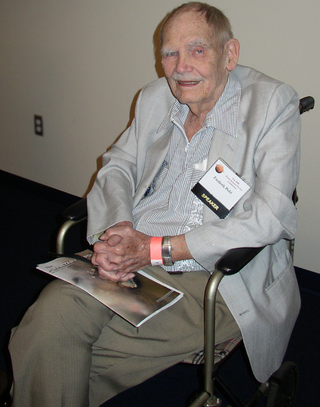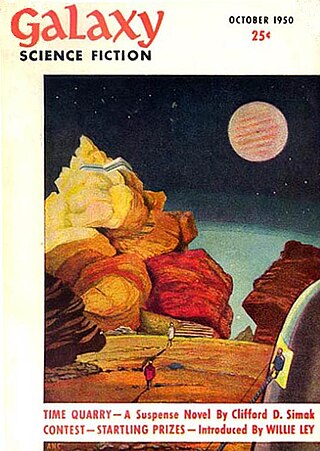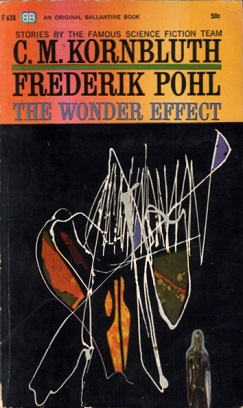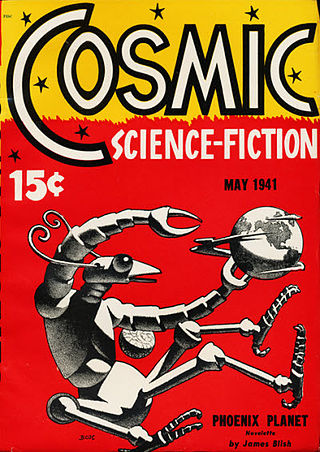
Cyril M. Kornbluth was an American science fiction author and a member of the Futurians. He used a variety of pen-names, including Cecil Corwin, S. D. Gottesman, Edward J. Bellin, Kenneth Falconer, Walter C. Davies, Simon Eisner, Jordan Park, Arthur Cooke, Paul Dennis Lavond, and Scott Mariner.

Frederik George Pohl Jr. was an American science-fiction writer, editor, and fan, with a career spanning nearly 75 years—from his first published work, the 1937 poem "Elegy to a Dead Satellite: Luna", to the 2011 novel All the Lives He Led.
Science fiction comedy or comic science fiction is a subgenre of science fiction or science fantasy that exploits the science fiction genre's conventions for comedic effect. Comic science fiction often mocks or satirizes standard science fiction conventions, concepts and tropes – such as alien invasion of Earth, interstellar travel, or futuristic technology. It can also satirize and criticize present-day society.

Galaxy Science Fiction was an American digest-size science fiction magazine, published in Boston from 1950 to 1980. It was founded by a French-Italian company, World Editions, which was looking to break into the American market. World Editions hired as editor H. L. Gold, who rapidly made Galaxy the leading science fiction magazine of its time, focusing on stories about social issues rather than technology.

Judith Josephine Grossman, who took the pen-name Judith Merril around 1945, was an American and then Canadian science fiction writer, editor and political activist, and one of the first women to be widely influential in those roles.
The 2nd World Science Fiction Convention (Worldcon), also known as Chicon I, was held on 1–2 September 1940 at the Hotel Chicagoan in Chicago, Illinois, United States.

"The Marching Morons" is a science fiction story by American writer Cyril M. Kornbluth, originally published in Galaxy in April 1951. It was included in The Science Fiction Hall of Fame, Volume Two after being voted one of the best novellas up to 1965.

The Space Merchants is a 1952 science fiction novel by American writers Frederik Pohl and Cyril M. Kornbluth. Originally published in Galaxy Science Fiction magazine as a serial entitled Gravy Planet, the novel was first published as a single volume in 1953, and has sold heavily since. It deals satirically with a hyper-developed consumerism, seen through the eyes of an advertising executive. In 1984, Pohl published a sequel, The Merchants' War. In 2012, it was included in the Library of America omnibus American Science Fiction: Four Classic Novels 1953–1956. Pohl revised the original novel in 2011 with added material and more contemporary references.

Super Science Stories was an American pulp science fiction magazine published by Popular Publications from 1940 to 1943, and again from 1949 to 1951. Popular launched it under their Fictioneers imprint, which they used for magazines, paying writers less than one cent per word. Frederik Pohl was hired in late 1939, at 19 years old, to edit the magazine; he also edited Astonishing Stories, a companion science fiction publication. Pohl left in mid-1941 and Super Science Stories was given to Alden H. Norton to edit; a few months later Norton rehired Pohl as an assistant. Popular gave Pohl a very low budget, so most manuscripts submitted to Super Science Stories had already been rejected by the higher-paying magazines. This made it difficult to acquire good fiction, but Pohl was able to acquire stories for the early issues from the Futurians, a group of young science fiction fans and aspiring writers.

The Merchants' War is a 1984 satirical science fiction novel by American writer Frederik Pohl. Set in a near future commercial dystopian interplanetary society, the novel was a sequel to The Space Merchants, and was originally co-published with it as Venus, Inc. Pohl's collaborator in the first novel, C.M. Kornbluth, died in 1958, and so did not contribute to this sequel.

The Wonder Effect is a collection of science fiction stories by American writers Frederik Pohl and Cyril M. Kornbluth, published by Ballantine Books in 1962.
Astonishing Stories was an American pulp science fiction magazine, published by Popular Publications between 1940 and 1943. It was founded under Popular's "Fictioneers" imprint, which paid lower rates than Popular's other magazines. The magazine's first editor was Frederik Pohl, who also edited a companion publication, Super Science Stories. After nine issues Pohl was replaced by Alden H. Norton, who subsequently rehired Pohl as an assistant. The budget for Astonishing was very low, which made it difficult to acquire good fiction, but through his membership in the Futurians, a group of young science fiction fans and aspiring writers, Pohl was able to find material to fill the early issues. The magazine was successful, and Pohl was able to increase his pay rates slightly within a year. He managed to obtain stories by writers who subsequently became very well known, such as Isaac Asimov and Robert Heinlein. After Pohl entered the army in early 1943, wartime paper shortages led Popular to cease publication of Astonishing. The final issue was dated April of that year.

Cosmic Stories and Stirring Science Stories were two American pulp science fiction magazines that published a total of seven issues in 1941 and 1942. Both Cosmic and Stirring were edited by Donald A. Wollheim and launched by the same publisher, appearing in alternate months. Wollheim had no budget at all for fiction, so he solicited stories from his friends among the Futurians, a group of young science fiction fans including James Blish and C. M. Kornbluth. Isaac Asimov contributed a story, but later insisted on payment after hearing that F. Orlin Tremaine, the editor of the competing science fiction magazine Comet, was irate at the idea of a magazine that might "siphon readership from magazines that paid", and thought that authors who contributed should be blacklisted. Kornbluth was the most prolific contributor, under several pseudonyms; one of his stories, "Thirteen O'Clock", published under the pseudonym "Cecil Corwin", was very successful, and helped to make his reputation in the field. The magazines ceased publication in late 1941, but Wollheim was able to find a publisher for one further issue of Stirring Science Stories in March 1942 before war restrictions forced it to close again.

Comet was a pulp magazine which published five issues from December 1940 to July 1941. It was edited by F. Orlin Tremaine, who had edited Astounding Stories, one of the leaders of the science fiction magazine field, for several years in the mid-1930s. Tremaine paid one cent per word, which was higher than some of the competing magazines, but the publisher, H-K Publications based in Springfield, MA, was unable to sustain the magazine while it gained circulation, and it was cancelled after less than a year when Tremaine resigned. Comet published fiction by several well-known and popular writers, including E.E. Smith and Robert Moore Williams. The young Isaac Asimov, visiting Tremaine in Comet's offices, was alarmed when Tremaine asserted that anyone who gave stories to competing magazines for no pay should be blacklisted; Asimov promptly insisted that Donald Wollheim, to whom he had given a free story, should make him a token payment so he could say he had been paid.

Gunner Cade is a science fiction novel by American writers Cyril M. Kornbluth and Judith Merril, originally serialized in Astounding Science Fiction in 1952. It was issued in hardcover by Simon & Schuster later that year, with an Ace Double paperback following in 1957. Gollancz issued a British hardcover in 1964, with a Penguin paperback following in 1966. The Science Fiction Book Club published an edition in 1965, with a Dell paperback appearing in 1969. Reprint editions continued to appear in the 1970s and 1980s. NESFA Press included the novel in a 2008 omnibus of Kornbluth and Merril novels, Spaced Out.

The Explorers is a collection of science fiction stories by American writer C. M. Kornbluth, originally published in paperback by Ballantine Books in 1954. Ballantine reissued the collection, which was Kornbluth's first, in 1963. While no further editions of the collection were published, six of its nine stories were included in Ballantine's 1977 The Best of C. M. Kornbluth, and all the stories are contained in NESFA's 1997 His Share of Glory: The Complete Short Science Fiction of C. M. Kornbluth.

A Mile Beyond the Moon is a collection of science fiction stories by American writer C. M. Kornbluth, originally published as a Doubleday hardcover in 1958, shortly after Kornbluth's death. A Science Fiction Book Club edition appeared in 1959, with an abridged paperback edition following from Macfadden Books in 1962. Macfadden reissued the collection in 1966 and, as Manor Books, in 1972 and 1976. A German translation appeared in 1974, and an Italian translation in 1987. While no further editions of the collection were published, all the stories are contained in NESFA's 1997 His Share of Glory: The Complete Short Science Fiction of C. M. Kornbluth.
This is an incomplete list of works by American space opera and science fiction author Frederik Pohl, including co-authored works.
Joseph Harold ("Harry") Dockweiler was a science-fiction author and literary agent. Dockweiler was best known by his pen name Dirk Wylie. Dockweiler was a member of The Futurians, a 1940s-era science-fiction fan community.

The Best of C. M. Kornbluth is a collection of science fiction and fantasy short stories by American author C. M. Kornbluth, edited by Frederik Pohl. It was first published in hardback by Nelson Doubleday in October 1976 and in paperback by Ballantine Books in January 1977, as a volume in its Classic Library of Science Fiction. A second hardcover edition was issued by Taplinger in November 1977, and an ebook edition by Faded Page in December 2017.














